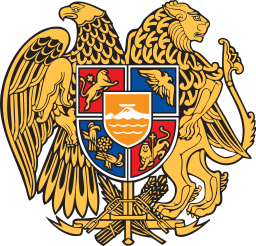COOPERATION WITHIN THE FRAMEWORK OF MEMBERSHIP IN
INTERNATIONAL ORGANIZATIONS
THE FOOD AND AGRICULTURE ORGANIZATION OF THE UNITED NATIONS
The Food and Agriculture Organization (FAO), one of the largest specialized agencies in the UN system, leads international efforts to tackle hunger. Founded in 1945, the organization now has 194 member states and operates in more than 130 countries.
The Republic of Armenia is a member of FAO since 1993, and the organization’s representation office was established in Armenia in 2004.
The 2016-2020 Country Programming Framework of cooperation between Armenia and FAO includes three priority areas:
- Sustainable use of natural resources, disaster risk reduction and management,
- Animal health, plant protection, and food safety and quality,
- Food security, nutrition security, and poverty alleviation.
Projects under implementation:
- Developing capacity in risk assessment and management of food safety and animal health
Goal: Assistance in improving the quality and safety of food products manufactured and consumed in Armenia and increasing competitiveness in the field of international trade. - Developing the regional capacity with regard to design and implementation of nutrition-focused social protection program to reduce food insecurity and malnutrition
Goal: Assistance to the RA Government and relevant stakeholders in design and implementation of nutrition-focused social protection program to reduce food insecurity and malnutrition in the target Marzes. - Strategy for reduction of volumes of food loss and waste
Goal: Promotion of reduction of volumes of food loss and waste at the project implementation sites, which will support the realization of national efforts aimed at mitigation of the impact by climate change and reduction of pressure applied on the national food systems for increase of production. - Assistance to improvement of the plant pest control and national phytosanitary certification system
Goal: Assistance to increase the efficiency of phytosanitary services needed for sustainable climate change transitions to address climate change threats, such as the impact of plant pests on food systems and trade. - Assistance to agricultural policy development
Goal: Improvement of policies related to development of agriculture, rural areas and land plots, and proposals of methods for implementation of policy-aimed measures.
Developing capacity for strengthening food security and nutrition in selected countries of the Caucasus and Central Asia – Goal: The project will bring together tools and best practices for awareness about capacity building, policy dialogue, food security and nutrition strategies, including nutrition-sensitive social protection and school nutrition projects. Regional: Armenia, Kyrgyzstan, and Tajikistan. - Improving human security in vulnerable communities of Armenia
Goal: Assistance to Armenia’s efforts for achievement of the 2030 Agenda for Sustainable Development by addressing the key causes of human insecurity of vulnerable communities and their inhabitants in the target Marzes, improving their lifestyle, creating sustainable economic opportunities, and building capacity. - Reducing the advance of antimicrobial resistance (AMR) in food and agriculture
Goal: Expansion of technical capabilities and provision of appropriate environment in the target countries. It is expected to contribute to involvement of the food and agricultural sector in the process of improvement and implementation of the AMR-related national action plans in the target countries of the project. The countries should implement a comprehensive AMR action plan through appropriate legislative reforms to manage the use of bacteria in the sector, execute data collection, and make changes to the food chain, in order to reduce the risk of AMR development and transmission in the food chain. Regional: Armenia, Belarus, Kazakhstan, Kyrgyzstan, and Tajikistan. - Establishment of land management instruments and institutional framework to address land abandonment issues
Goal: Assistance to the RA Ministry of Economy in solving the land abandonment problem by forming a new legal and institutional framework, as well as by developing a land management toolkit, which will be specifically focused on intermediated leasing. - Developing capacity in prices and market information systems and policy monitoring in response to COVID-19 and other shocks
Goal: Development of the country’s institutional capacity to combat the short-term risks and long-term market uncertainties. Regional: Armenia, Albania, Belarus, Kyrgyzstan, Northern Macedonia, Tajikistan, and Uzbekistan. - Creating favorable conditions for increase of climate sustainability in agriculture
Goal: The project will contribute to inclusion of the climate change adaptation processes in agriculture and food system. Regional: Armenia, Kyrgyzstan, Northern Macedonia, and Tajikistan. - Implementation of land degradation neutrality (LDN) commitments in Armenia through sustainable management and restoration of degraded landscape
Goal: Assistance to Armenia in implementing its land degradation neutrality commitments/responsibilities to achieve all four goals. - Technical assistance in reviewing the national forest policy and strategic framework
Goal: The project outcome and activities will directly contribute to the development of activities and projects focused on sustainable forest management currently operating in Armenia, in accordance with the Government priorities, as well as the FAO regional initiatives in Europe and Central Asia and the FAO strategic goals and sustainable development goals. - Socio-economic impact assessment of COVID-19
Goal: Collect and analyze information. Establish systems for ongoing monitoring and evaluation to minimize the adverse effects of COVID-19.
FAO Representation Office in Armenia
Raimund Jehle, FAO Representative in Armenia
Gayane Nasoyan, Assistant FAO Representative in Armenia
Address: Government Building #3, Floor 3, Room 362
Yerevan, 0010, Republic of Armenia
Tel: +374-10-525453
E-mail: FAO-AM@fao.org
URL: http://www.fao.org/armenia
BUSINESS ENVIRONMENT
(+374 11) 597 539
- BUSINESS ENVIRONMENT
- (+374 11) 597 539
TOURISM
(+374 11) 597 157
- TOURISM
- (+374 11) 597 157
QUALITY INFRASTRUCTURES
(+374 11) 597 167
- QUALITY INFRASTRUCTURES
- (+374 11) 597 167
PRODUCT LABORATORY TESTING
(+374 11) 597 166
- PRODUCT LABORATORY TESTING
- (+374 11) 597 166





